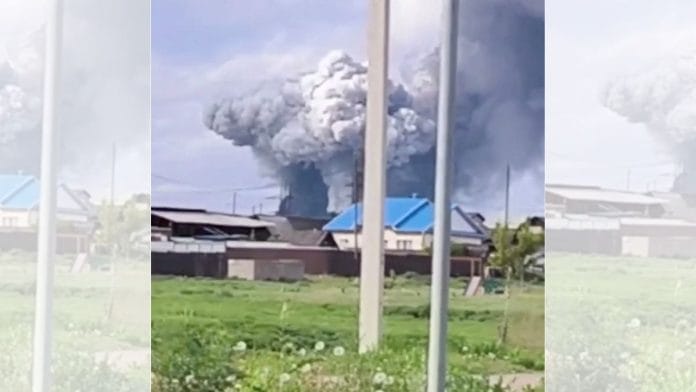Ukraine’s Operation Spider’s Web, a deep strike inside Russian territory, is being cast in Chinese online discourse not as Kyiv’s autonomous initiative but as a NATO-scripted manoeuvre. Across platforms like Zhihu, Baidu, and Weibo, the consensus is clear: The operation marks a new phase of Western escalation, with Ukraine as a proxy and NATO as the real orchestrator.
Chinese commentators argue that the strike, 18 months in the making, was designed to test Russia’s defences, provoke escalation, and push Moscow into a two-front war. The use of Western-supplied missiles and AI-guided drones is viewed as a direct threat to Russia’s assumed homeland security, revealing cracks in its military deterrence.
An article on Baidu described Spider’s Web as a “choreographed NATO production” designed to probe Russia’s red lines. Ukrainian President Volodymyr Zelenskyy is portrayed as dangerously ambitious, risking national security for Western backing. The strikes on command centres and strategic bomber bases are interpreted as part of a new Western strategy.
Escalation trumps diplomacy
The timing of the strikes, just ahead of peace talks, reinforced suspicions that diplomacy is being deliberately sidelined. “Ukraine smashed the olive branch on the table,” one commentator wrote on Baidu. A viral post on Weibo called the operation “a shot in the arm for Ukraine, a slap in the face for Russia, and a stumbling block for Trump.”
While there is concern about direct European involvement from countries like France or the UK, some Chinese voices remain more tempered. Wang Yiwei, a reporter, argues that two constraints still apply: Washington’s central role, regardless of leadership, and the military stalemate on the ground, which limits both sides’ manoeuvrability.
Many Chinese commentators are fixated on tactical takeaways. The use of low-cost first-person view (FPV) drones to strike deep into Russian territory is seen as a strategic leveller, forcing Russia into expensive, reactive defence. These tactics—cheap, smart, and asymmetric—are being closely studied and described as a defining feature of modern warfare.
There is also unease about the nuclear threshold. Under Russia’s revised nuclear posture, the targeting of strategic bomber bases could be read as a serious provocation. In the view of a Chinese vlogger, while a tactical nuclear response remains unlikely due to the risk of NATO retaliation, increased signalling or intensified drone and missile campaigns could follow.
Also read: Modi govt mishandled information war. CDS Chauhan’s loss admission raises 2 big questions
Power shifts
Operation Spider’s Web may not shift territorial control, but it has sharpened the psychological and political edges of the conflict. One widely shared Weibo post credited Ukraine’s unconventional leadership under Zelenskyy and intelligence chief Kyrylo Budanov for turning improbable tactics—like truck-borne drone attacks—into battlefield realities. In contrast, Russia’s command rigidity is seen as an Achilles’ heel.
Chinese analysts like Chen Feng and Shi Yang argue that the strikes, though bold, have not changed the conventional military balance. Russia still holds the advantage. But the symbolic impact is considerable. The Weibo hashtag “Ukraine has breached Putin’s red line” has already garnered over 80 million views.
Some Chinese thinkers interpret the strikes as a message not to Moscow, but to Washington. Researcher Gou Liwu of East China Normal University argues that Ukraine fears being sidelined by US President Donald Trump’s outreach to Russia. Kyiv’s bold moves, he suggests, aim to complicate any future US-Russia rapprochement, particularly one that might pressure Zelenskyy into concessions and weaken EU cohesion and fuel Right-wing populism in Europe.
Also read: Ukraine’s Op Spider’s Web shows novel drone tactics, offers lessons for India’s modern warfare
The long road to peace
China, on paper, supports dialogue, but its strategic community remains largely pessimistic about the prospects of a ceasefire. Yang Cheng, executive dean of the Shanghai Institute of Global Governance, argues the gulf between Russian and Ukrainian positions remains too wide. Wang Yiwei, Professor at the School of International Relations, Renmin University, echoes this, noting that external actors, especially the US and NATO, have made negotiations even harder. Deep mistrust and incompatible goals continue to block meaningful talks. Sun Zhuangzhi, director of the Institute of Russian, Eastern European and Central Asian Studies at the Chinese Academy of Social Sciences, states bluntly: “Positive results from negotiations will be difficult to achieve.”
At the same time, China sees opportunity. A prolonged war weakens Russia and deepens its dependence on Beijing, giving China leverage to extract strategic concessions. It also strengthens China’s hand in Europe, where Russia’s isolation makes Beijing a more attractive partner amid growing instability and prolonged war.
A Weibo post suggested that Ukraine’s success with low-cost drones underscores the power of asymmetric tactics, lessons China is likely to apply in its own strategic calculations, particularly with regard to Taiwan and the South China Sea.
Beijing is learning from the battlefield. But it is also quietly capitalising. For now, China can continue to call for de-escalation, while benefiting from a weakened, more dependent Russia.
Sana Hashmi is a fellow at the Taiwan-Asia Exchange Foundation. She tweets @sanahashmi1. Views are personal.
(Edited by Theres Sudeep)






